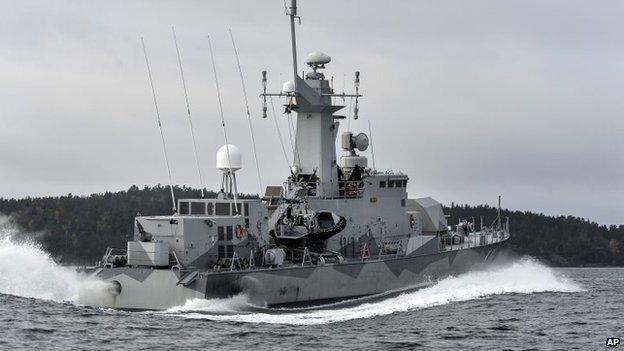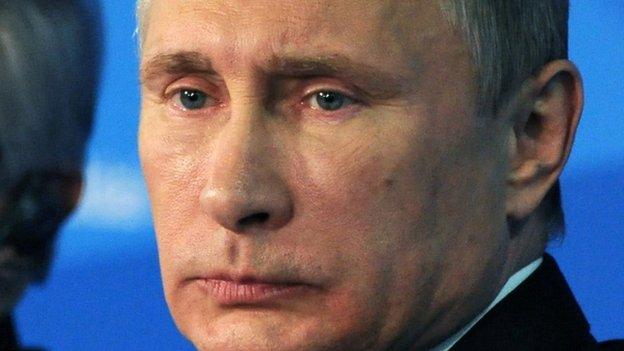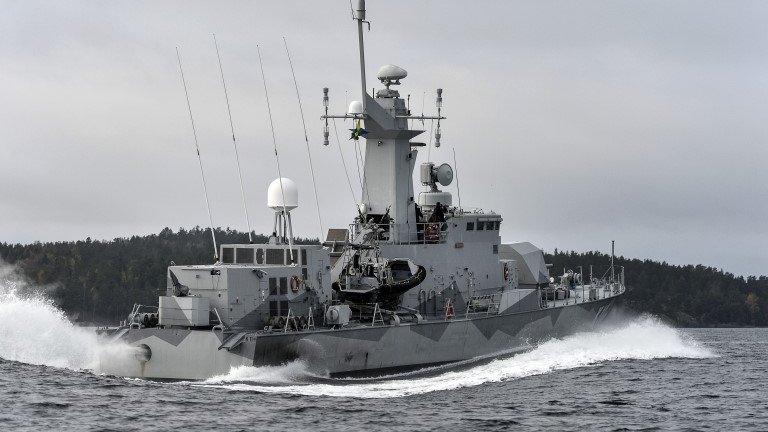Hybrid warfare: The new conflict between East and West
- Published
- comments

Swedish ships searched waters off Stockholm looking for a Russian submarine
A Russian submarine thought to be lurking in Swedish waters; Nato fighter jets scrambling to intercept Russian bombers; Russian spies, according to Czech intelligence, fanning out across Europe; an Estonian official allegedly snatched and spirited back to Moscow to be accused of spying.
All activity in the shadows or below the radar, accompanied by a barrage of anti-Western messages in the pro-Russian media - what has become known as "hybrid warfare", where propaganda and provocation take centre stage.
In fact Russia's probing of Nato borders and defences in the Baltic region is nothing new.
But the number of alleged incursions by Russian military aircraft has tripled in the last year, and Nato officials say the manoeuvres go deeper into Nato territory and are more provocative.
"What we've seen is an increased Russian military presence in the air, on the sea, and now under the sea," says Tomas Ries, senior lecturer at Sweden's National Defence College.
"One could say that this new sort of hybrid warfare is defined by the fact that there is no real distinction between war and peace.
"This is a signal from the Kremlin to the West that basically the old days are over. Russia is coming back on the scene and saying, 'We are strong and it is time for you to realise that you need to respect us.'"
Yet hybrid warfare is almost always deniable.
Western 'propaganda'
Remember those "little green men" who first appeared in Crimea to help facilitate the Russian takeover there? Or the Russian troops and heavy weaponry that surfaced in eastern Ukraine in support of pro-Russian rebels?
Now, as then, the Kremlin has been quick to deny involvement.
In fact, while the West reports a pattern of heightened Russian military and intelligence activity on Nato's eastern borders, Moscow argues the opposite:
There is no proof of a Russian submarine in Swedish waters
The Estonian official charged with espionage was on the Russian side of the border
Russian military activity in the Baltics is routine and always in international airspace or waters
And what is more, says the Kremlin, if there is any hybrid warfare going on, it is a propaganda campaign inspired and orchestrated by Western governments and led by the US, in order to paint Russia as the enemy.
"I'm not saying Russia is blameless," says Dmitry Linnik, London bureau chief of the Voice of Russia radio station.
"But spinning the whole thing the way the Western media and politicians have been doing is not just irresponsible, it is actually geared towards isolating and punishing Russia, to drive a wedge between Russia and Europe. Russia is being turned into a bogeyman."
Russian officials now routinely blame the United States for almost everything.

Vladimir Putin trades on his reputation as a hard man
Nikolai Patrushev, Russia's former spy chief and - it's thought - a close friend of President Putin's, recently even accused the Americans of entangling the Soviet Union in a crippling Afghan war and then deliberately weakening it economically to bring about its collapse in 1991.
And according to President Putin, the US is still trying to undermine Russia.
In his annual speech to the so-called Valdai Club, he claimed Russia was taking the place of the USSR as the "centre of evil" in American propaganda, in order to "draw dividing lines and put together coalitions directed against an enemy, as was the case during the Cold War years".
But Russia's position leaves a puzzle.
No trust
On the one hand President Putin complains about being treated with suspicion, on the other he seems to want to project Russia as a resurgent power prepared to strike back if its interests are ignored.
So how does he intend to win back friends in Europe, if governments see Russia as threatening?
Clifford Gaddy, from the Brookings Institution in Washington, co-author of a recent profile of President Putin, external, says the point is he wants people to be afraid of him.
"It is a fundamental principle of Russian foreign and security policy in particular that you can't really trust anyone," he says.
"You have to have some kind of form of intimidation or hook or blackmail threats that would ensure that they behave the way you want."
In the new grey land of hybrid warfare, goes the theory, there are no longer good and bad guys.
"It's been called a liquid ideology or a post-modernist ideology," says Ilya Zaslavsky, a fellow at the Royal Institute of International Affairs in London.
"The idea is that no-one now has an ideology, so that you can argue everyone is cynical and we are just cynical and corrupt as everyone else.
"They actually want to present Russia as a baddie and a bully. It conveniently folds into their own virtual neo-Cold War reality, where Russia is a besieged castle surrounded by enemies and has to fight back."
It makes for a confusing and complex conflict. And the question then is - where is it heading?
Total break
Mr Gaddy says he does not think President Putin wants a total break with the West, but he is also doubtful that Western sanctions will make Russia change its behaviour.
In fact he is worried that if sanctions continue to isolate Russia, the next escalation in this war of shadows could be highly dangerous.
He says: "We're in the world which is so highly integrated, especially electronically, if we push Russia out of that integration, we are in effect making it more likely that Russia would actually employ cyber-weapons in a very, very dangerous way - namely targeting our financial systems - because we are reducing the cost to them of doing that."
It is a scenario dismissed by Mr Linnik as yet more scare-mongering.
"I think Moscow is much more pragmatic than it is given credit for," he says.
"I don't think Moscow is even considering that sort of path, and hopefully that realisation will sink in in the West as well."
But the problem is, in the murky world of hybrid warfare where everything is deniable and nothing is certain, who knows how this crisis will unfold?
- Published24 October 2014
